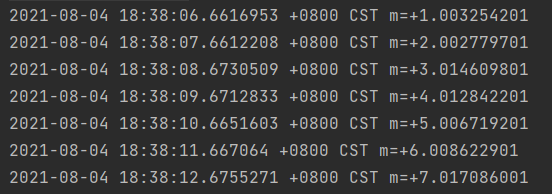11, time standard package
The time package provides functions for time display and measurement. The Gregorian calendar is used for the calculation of the 8 calendar.
11.1 time type
time. The time type represents time. We can use time The now() function obtains the current time object, and then obtains the information such as year, month, day, hour, minute and second of the time object. The example code is as follows:
func main() {
now := time.Now() //get SysTime
fmt.Println("Now the time is:", now)
//The current time is: 2021-08-04 18:02:52.864717 +0800 CST m=+0.002099601
year := now.Year()
month := now.Month()
day := now.Day()
hour := now.Hour()
minute := now.Minute()
second := now.Second()
fmt.Printf("Now:%d year%d month%d day%d Time%d branch%d second", year, month, day, hour, minute, second)
//Now it is: 18:5:26 on August 4, 2021
}
11.2 time stamp
Use time Unix() function can convert time war to time format.
func main() {
now := time.Now() //get SysTime
fmt.Println("Now the time is:", now)
//The current time is: 2021-08-04 18:14:22.4631104 +0800 CST m=+0.002645001
fmt.Println(now.Unix()) //Timestamp 1628072062 seconds
fmt.Println(now.UnixNano()) //Timestamp 1628072062463110400 nanoseconds
now2 := time.Unix(now.Unix(), 0)
fmt.Println(now2) //2021-08-04 18:14:22 +0800 CST
}
11.3 time interval
The Duration type represents the elapsed time between two time points, in nanoseconds. The longest period that can be expressed is about 290 years.
For example: time Duration means 1 nanosecond, time Second means 1 second.
const ( Nanosecond Duration = 1 Microsecond = 1000 * Nanosecond Millisecond = 1000 * Microsecond Second = 1000 * Millisecond Minute = 60 * Second Hour = 60 * Minute }
11.4 time operation
11.4. 1. Add add
In the daily coding process, you may encounter the requirement of time + time interval. The time object of Go language provides the Add method.
func main() {
now := time.Now() //get SysTime
fmt.Println("Now the time is:", now)
//The current time is: 2021-08-04 18:25:46.0697561 +0800 CST m=+0.002079701
next := now.Add(time.**Hour** * 2)
fmt.Println("The time after two hours is:",next)
//Two hours later: 2021-08-04 20:25:46.0697561 +0800 CST m=+7200.002079701
}
14.4. 2. Time difference Sub
func (t Time) Sub(u Time) Duration {
}
Find the difference between two times and return a time period t-u. If the result exceeds Duration Maximum value that can be represented/Minimum value, the maximum value will be returned/Minimum value. To get a point in time t-d (d by Duration),have access to t,Add(-d).
func main() {
parse, err := time.Parse("2006-01-02 15:04:05.000", "2021-08-04 18:52:17.723")
if err == nil {
r := time.Now().UTC()
fmt.Println(r)//2021-08-04 11:29:17.9214356 +0000 UTC
fmt.Println(parse)//2021-08-04 18:52:17.723 +0000 UTC
parse = parse.UTC()
duration := r.Sub(parse)
fmt.Println(duration)//-7h22m59.8015644s
}else {
fmt.Println("Time conversion error:",err)//2021-08-04 18:52:17.723 +0000 UTC
}
}
14.4. 3. Is the time Equal
func (t Time) Equal(u Time) bool
To judge whether the two times are the same, the influence of time zone will be considered, so the time of different time zone standards can also be compared correctly. This method is different from t==u. this method also compares location and time zone information,
14.4. 4. Is the time Before
func (t Time) Before(u Time) bool
If the time point represented by t is before u, it returns true; Otherwise, false is returned.
14.4. 5. Is the time After
func (t Time) After(u Time) bool
If the time point represented by t is after u, it returns true; Otherwise, false is returned.
14.4. 6. Timer
Use time Tick (time interval) to set the timer. The timer is essentially a channel
func main() {
ticker := time.Tick(time.**Second**) //Define a timer with an interval of 1 second
for i := range ticker {
fmt.Println(i) //Tasks executed every second
}
}

14.4. 7. Time formatting
The time type has its own Format method. It should be noted that the Format time template in Go language is not the common Y-m-d H:M:S, but uses the birth time of Go at 15:04:05.000 seconds on January 2, 2006 (the memory formula is 200612345). If you want to Format it as 12 hour mode, specify PM
func main() {
now := time.Now()
//The formatted template is Go's birth time at 15:04:05 on January 2, 2086 Mon Jan
fmt.Println(now.Format("2006-01-02 15:04:05.000 Mon Jan")) //24-hour 2021-08-04 18:44:36.413 Wed Aug
fmt.Println(now.Format("2006-01-02 03:04:05.000 Mon Jan")) //12 hour system 2021-08-04 06:44:36.413 Wed Aug
fmt.Println(now.Format("2006 January 2, 2015 15:04:05.000 second Mon Jan")) //August 4, 2021 18:44:36.413 Wed Aug
fmt.Println(now.Format("2006/01/02")) //2021/08/04
fmt.Println(now.Format("03:04:05.000")) //06:44:36.413
fmt.Println(now.Format("2006-01-02 03:04:05.000")) //2021-08-04 06:44:36.413
}
14.4. 8. Convert string to timestamp
func main() {
parse, err := time.Parse("2006-01-02 15:04:05.000", "2021-08-04 18:52:17.723")
if err == nil {
fmt.Println(parse)
}else {
fmt.Println("Time conversion error:",err)//2021-08-04 18:52:17.723 +0000 UTC
}
}
14.5,sleep()
func main() {
time.Sleep(1000)
fmt.Println("hello")
n := 1000
time.Sleep(time.Duration(n))
fmt.Println("world")
}
14.6 time zone correlation
func main() {
now := time.Now() //Local time
fmt.Println(now)//2021-08-04 19:54:21.8713356 +0800 CST m=+0.002121301
//This time tomorrow
//Take the time to parse a string format according to the specified format
parse, err2 := time.Parse("2006-01-02 15:04:05", "2021-08-04 14:41:50")
if err2 == nil {
fmt.Println("The resolution time is:", parse)//Resolution time: 2021-08-04 14:41:50 +0000 UTC
} else {
fmt.Println("Time resolution failed:",err2)
}
//Take and parse the time in a string format according to the time zone and format of Dongba district
//Load time zone based on string
loc, err := time.LoadLocation("Asia/Shanghai")
if err == nil {
fmt.Println("The local time zone is:", loc)//The local time zone is Asia/Shanghai
} else {
fmt.Println("Time zone conversion failed:",err)
}
parse, err2 = time.ParseInLocation("2006-01-02 15:04:05", "2019-08-04 14:41:50", loc)
if err2 == nil {
fmt.Println("The local time of resolution is:", parse)//The local time of parsing is: 2019-08-04 14:41:50 +0800 CST
} else {
fmt.Println("Local time resolution failed:",err2)
}
}